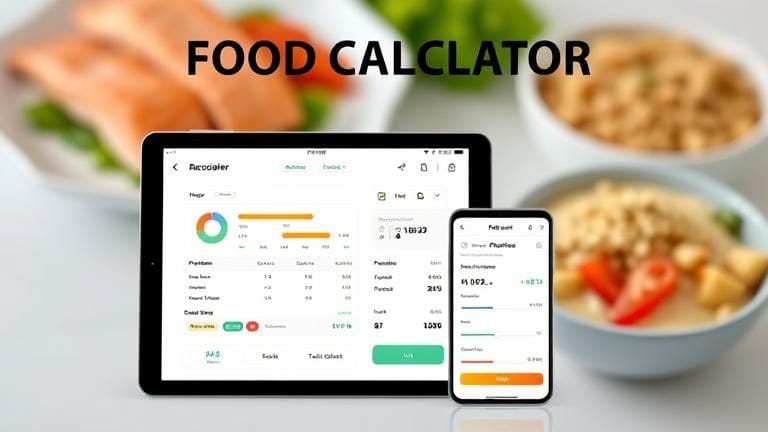Introduction
Tracking your daily intake of calories, carbohydrates, fats, and proteins is key to achieving your health and fitness goals. Whether you’re aiming to lose weight, build muscle, or simply eat more mindfully, using a food calculator can make this process simple and accurate. By calculating exactly what you consume, you gain control over your nutrition and avoid guesswork.
This guide will explain what a food calculator is, how it works, and how integrating a proteine calculator, carb calculator, and fat calculators can help you customize your diet. We’ll also share practical tips to get the most out of these tools and include an easy-to-use macronutrient calculator you can apply immediately. 🍽️⚖️
Macronutrient Calculator 🥑🍗🍞
Why Use a Food Calculator? The Benefits Explained
Precision for Better Results
Using a foods calculator allows you to monitor your intake of calories, protein, carbs, and fat with precision. This data is essential to ensure you meet your specific goals without over- or under-eating.
Tailored Nutrition for Your Goals
No two bodies are the same. A protein calculator helps you find how much protein you need daily based on your weight and activity level. Likewise, a carb calculator guides your carbohydrate intake depending on your energy needs, and a fats calculator helps balance fat consumption for hormonal and overall health.
Simplifying Nutrition Tracking
Manually tracking your macronutrients can be tedious and prone to error. A food calculator automates this process, saving time and helping you stay consistent in your nutrition habits.
How Does a Food Calculator Work?
Step 1: Input Your Food Choices
The first step is to enter the foods you’ve eaten, specifying amounts like grams, cups, or pieces. Most calculators connect to large food databases to fetch accurate nutrition info instantly.
Step 2: Automatic Macronutrient and Calorie Calculation
The calculator then provides a detailed breakdown of:
- Total calories consumed
- Amount of protein
- Amount of carbohydrates
- Amount of fat
Step 3: Adjust and Plan
With clear insights into your intake, you can modify portions or swap foods to align with your nutrition goals, whether that means increasing protein for muscle growth or reducing carbs for fat loss.
Macronutrients Breakdown: What You Need to Know
Protein and the Protein Calculator
Protein is vital for muscle repair, recovery, and satiety. A reliable protein calculator helps you determine your daily protein needs, typically ranging from 1.2 to 2.0 grams per kilogram of body weight depending on your activity level and goals.
Carbohydrates and the Carb Calculator
Carbs are the body’s main energy source. The carbs calculator lets you balance your carbohydrate intake based on your activity. Higher activity levels usually require more carbs, while lower activity or weight loss goals might call for less.
Fats and the Calculator
Fats support hormone production, brain function, and overall health. Using a calculator, you can keep your fat intake within recommended ranges (usually 20-35% of total calories) while focusing on healthy fats like omega-3s and unsaturated fats.
Practical Ways to Use a Foods Calculator Daily
Apps and Websites
Many free and premium apps incorporate comprehensive foody calculators with built-in protein calculators, carbs calculators, and fat calculators. These often include barcode scanners, recipe builders, and progress trackers to make logging easy and engaging.
Personalized Spreadsheets
For those who prefer manual tracking, custom spreadsheets with embedded macros calculations can offer flexibility and control.
Macronutrient Calculator: Quick Estimation Tool
Try this simple calculator to estimate your daily protein, carbs, and fat needs:
| Input | Value |
|---|---|
| Weight (kg) | [__________] |
| Goal | [Lose / Maintain / Gain] |
Estimated daily needs:
- Protein (grams): Weight × (1.2 to 2.0 depending on goal)
- Carbohydrates (grams): Adjust based on activity level
- Fat (grams): 20-35% of daily calories
Tips to Maximize Your Calculated Results
Be Consistent but Flexible
While tracking is important, avoid obsessing over every gram. Use the best calculator as a helpful guide and listen to your body’s hunger and fullness cues.
Focus on Whole Foods
A food calculator is a tool, but it’s your food choices that matter most. Aim for nutrient-dense, whole foods to get the best health benefits.
Update Regularly
Your body and goals change over time. Make sure to update your inputs to keep your calculator aligned with your current needs.
Conclusion
A food calculator is a powerful ally in your nutrition journey, giving you accurate insights into your calorie and macronutrient intake. By leveraging tools like a protein, carbs and fat, you can tailor your diet precisely to your lifestyle and goals.
Start tracking today, and watch how this simple habit can transform your approach to food and health. With the right data at your fingertips, eating well becomes easier and more effective. Ready to take control of your nutrition? Your body will thank you! 💪🥗




